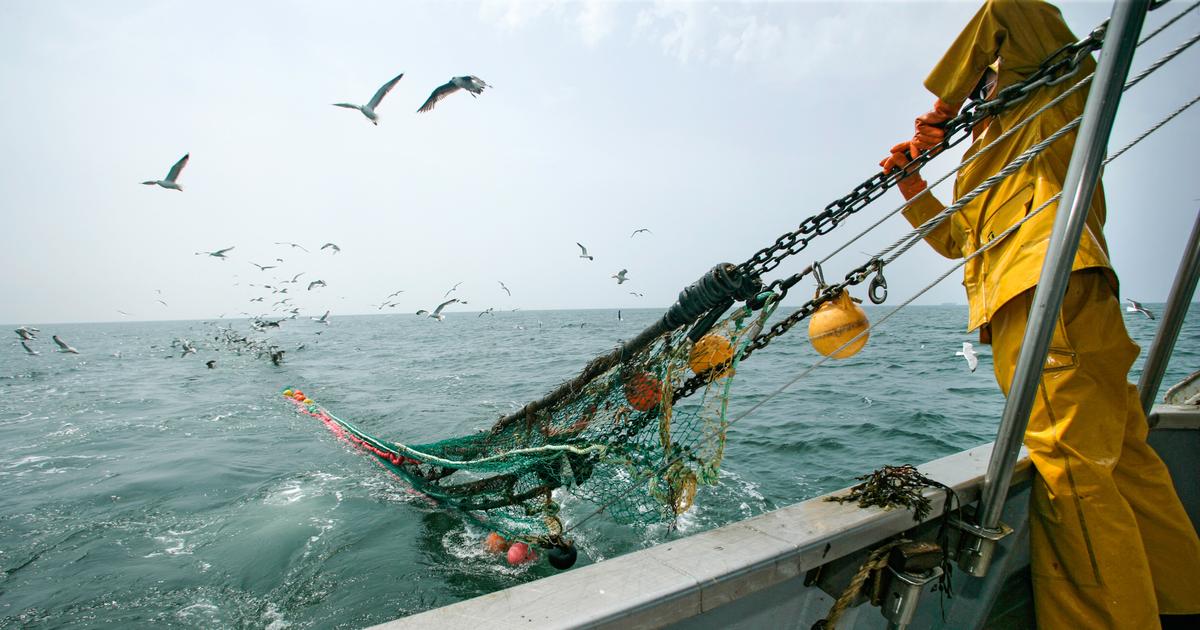Expand marine protected areas and prohibit trawling there, better counter overexploitation, less energy-intensive boats... the European Commission presented its plan to "
green
" the fishing sector, immediately decried by professionals and deemed too timid by environmental NGOs.
Ten years after the major reform of the Common Fisheries Policy, "
structural transformations
" are essential to reduce the environmental impact, while guaranteeing the profitability of the sector and its carbon neutrality by 2050, acknowledged the European Commissioner Virginius Sinkevicius.
Read alsoBrexit and fishing: 90 French ships eligible for scrapping, i.e. 3% of the fleet concerned according to the ministry
A third of the stocks is still victim of overfishing in the North-East Atlantic (against some 70% in the 2000s), some 85% of the stocks in the Mediterranean remain overexploited.
The obligation to land all catches, aimed at limiting "
accidental
" catches thrown back into the sea, remains little applied according to Brussels.
The “
action plan
” unveiled on Tuesday therefore calls on states to set their annual catch quotas in a more transparent manner and respecting the maximum levels recommended by scientists.
Above all, States will be required to adopt measures to "
phasing out
" bottom trawling by 2030 in marine protected areas (currently 12% of European waters, 30% targeted by 2030), regardless of their depth.
Each country will have to establish its roadmap by March 2024. Brussels will assess them, before proposing new legislation if necessary.
The EU has already banned trawling below 800m since 2016, to help restore vulnerable seabed ecosystems with rich biodiversity.
But the use of mobile bottom gear (trawls, dredges, gillnets, longlines, traps, etc.) "
remains very widespread
", in 80% to 90% of the exploitable areas of the North-East Atlantic and "
in many 'Natura2000' sites and other protected areas
", deplores the European executive.
Enough to compromise the objectives of the Twenty-Seven in terms of climate and biodiversity: Brussels denounces a practice that consumes a lot of fuel and emits a lot of CO2, which by scraping the funds destroys ecosystems which themselves constitute carbon sinks, weakens populations of fish that breed there, and encourages "
disproportionate
"
incidental catches due to lack of selectivity.
The Commission also asks the States to extend the "
marine protected areas
" to reach the objective of 30% of the marine space set in the European biodiversity plan, and to establish limits on accidental catches for certain vulnerable species (dolphin of the Bay of Biscay, porpoises, rays, etc.).
A disputed European plan
The European Bottom Fisheries Alliance (EBFA), which represents 20,000 fishermen from 14 countries, judges that the ban on trawling in protected areas will “endanger 7,000 vessels” corresponding to “25% of the
volumes
landed
in the EU and 38% of the total revenue of the European fleet
".
This measure is "
unjustified
" because "
certain areas have been defined to preserve birds and turtles
" unrelated to the funds, and "
the only result will be to displace fishing efforts, increasing the fuel consumed and the undesirable repercussions on stocks
“, or even encourage the EU to import more fish, insists its president Ivan Lopez.
Conversely, the NGO Oceana welcomes the measure but is concerned about the timetable, observing that the EU will tolerate bottom trawling for another seven years in protected areas.
Finally, Brussels details its ambition to make fishing boats and gear less fuel-intensive and to encourage their switch to clean energies (hydrogen, biofuels, electricity, etc.), a "
difficult and gradual transition
” which will be discussed “
in coordination
” with States and fishermen.
“Eliminate fossil fuel subsidies”
In addition to the environmental impact, the objective is to reduce dependence on fossil fuels: "
Marine diesel prices have more than doubled in 2022, with an energy bill equivalent to 35% of the sector's revenues, compared to 13% in 2020
" , explained Virginijus Sinkevicius.
Read alsoThe WTO launches a “second wave” of negotiations on fisheries subsidies
Brussels calls on states to “
better use the European funds
” available to offset “
short-term socio-economic impacts
”, modernize ships and fund research.
"
An economic incentive and financial sanctions are clearly necessary to push decarbonization (...) Above all, we must eliminate all fossil fuel subsidies
", which are still massive in the sector, underlines Rebecca Hubbard, from the coordination of NGO Our Fish .
In 2020, the 56,000 active fishing vessels in the EU (124,600 fishermen) burned 1.9 billion liters of fuel to bring 3.94 million tonnes of catches ashore.















/cloudfront-eu-central-1.images.arcpublishing.com/prisa/GP2ZXWJRROQQUNBAGJPH3WIOVQ.jpg)